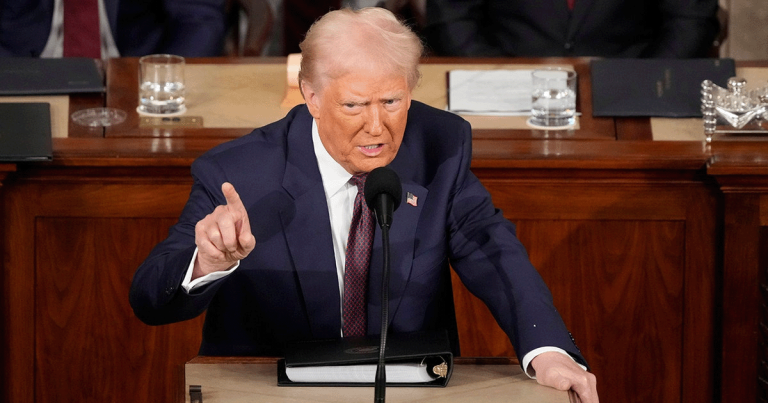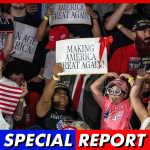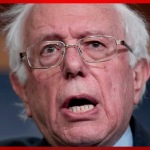
President Trump’s tariff strategy has sent shockwaves through the global economy, and Democrats are absolutely beside themselves. Their panic isn’t about protecting American jobs or industry, mind you – it’s about appeasing the globalist elites who’ve been feeding at the free trade trough for decades. Since Trump reclaimed the White House, liberal economists and media pundits have been predicting economic apocalypse over his aggressive trade policies. “The sky is falling!” they’ve cried. “Consumer prices will skyrocket!” they’ve warned.
Well, guess what? The sky remains firmly in place, and the president’s bold strategy is already bearing fruit. The doomsday predictions from the same “experts” who said Trump would crash the economy in his first term have once again proven to be nothing more than partisan fear-mongering. With each passing day, it’s becoming clearer that Trump’s “America First” approach is working exactly as designed – not that you’ll hear that admission on CNN anytime soon.
President Trump announced Thursday he will sign a “full and comprehensive” trade deal with the United Kingdom – the first formal agreement since his sweeping tariff initiative began last month. The deal marks a significant victory for Trump’s aggressive negotiation tactics and signals that other nations may soon follow suit in seeking favorable trade terms with the United States.
From ‘The Post Millennial’:
“The agreement with the United Kingdom is a full and comprehensive one that will cement the relationship between the United States and the United Kingdom for many years to come. Because of our long time history and allegiance together, it is a great honor to have the United Kingdom as our FIRST announcement. Many other deals, which are in serious stages of negotiation, to follow!”
Trump revealed the breakthrough on Truth Social early Thursday, adding that he would hold a press conference at the White House Oval Office at 10 a.m. ET to provide details. This deal comes after Trump implemented a 90-day pause on most of the tariffs he established in April, which he memorably dubbed “liberation day.”
Special Relationship, Special Deal
The UK has been seeking a deal with the United States – its largest trading partner – since leaving the European Union in 2020. With annual trade totaling a massive £314.6 billion ($417.6 billion) between the two nations, securing favorable terms has been a top priority for Britain’s government.
According to reporting from The Telegraph, British cars and steel will receive protection from the full force of Trump’s 25% tariff imposed on auto industry products. In exchange, the UK has offered concessions on taxes previously imposed on American tech companies – a smart move that benefits Silicon Valley while protecting British manufacturing.
The timing couldn’t be more significant. As the 5th largest importer of American goods, the UK was an important first domino to fall in what Trump’s administration has suggested will be a cascade of new trade agreements. Treasury Secretary Scott Bessent previously hinted at this strategy, noting that Trump created “strategic uncertainty” to strengthen America’s negotiating position.
While Critics Whined, Trump Delivered
Remember all those dire warnings from liberal economists? They insisted Trump’s tariffs would destroy the economy, hurt American consumers, and isolate the United States from global trade partners. Yet here we are, just over a month since “liberation day,” and countries are already lining up to make deals.
As Trump bluntly put it during a press conference Tuesday: “Everyone says, ‘When, when? When are you going to sign deals?’ We don’t have to sign deals. They have to sign deals with us. They want a piece of our market. We don’t want a piece of their market.” That’s the kind of straight talk about American economic leverage that sends globalists running for their fainting couches.
Recent polls from CNBC and NBC News have shown lower approval numbers for Trump’s handling of tariffs compared to other issues, but that’s likely to change as more deals materialize and Americans see the strategy paying dividends. Just as critics were wrong about Trump’s economic policies during his first term, their predictions about his trade strategy appear equally misguided.
Just the First Domino to Fall
The UK deal represents just the beginning of what could become a wholesale realignment of global trade relationships. Trump administration officials have suggested that more than ten “amazing” deals are in various stages of negotiation. Contrary to the doom-and-gloom narrative from the liberal media, countries aren’t recoiling from the United States – they’re scrambling to secure favorable terms.
For decades, globalist trade policies have sacrificed American manufacturing jobs on the altar of “free trade” that was anything but free. Trump’s approach flips that dynamic, using America’s massive consumer market as leverage to secure better deals for American workers and industries.
This is precisely what Trump promised on the campaign trail – using tough negotiation tactics to revitalize American manufacturing and reduce trade deficits. The Britain deal demonstrates that when push comes to shove, other countries need access to American markets far more than America needs access to theirs. That’s not economic isolationism; it’s smart business.
Key Takeaways:
- Trump’s tariff strategy is already working, forcing other nations to negotiate favorable terms for American industries despite liberal predictions of economic disaster
- The UK deal protects British automotive and steel industries from the full force of tariffs while securing concessions on tech taxes that benefit American companies
- This is just the first of many trade deals in “serious stages of negotiation,” proving Trump’s America First approach creates leverage rather than isolation
Sources: The Post Millennial, NBC News


